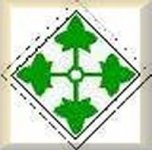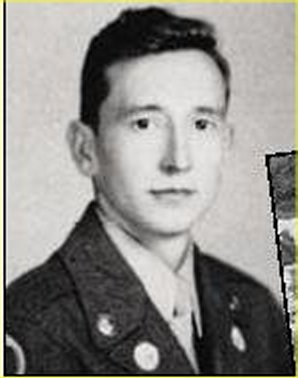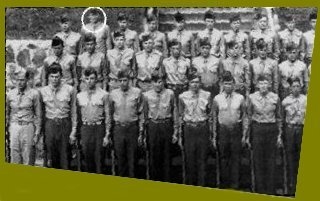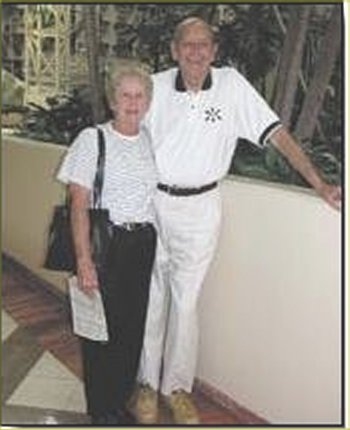



 Awb Norris, the C.O. of 2/22Inf.(M)....'67 - '68
Awb Norris, the C.O. of 2/22Inf.(M)....'67 - '68
Beloved "Colonel" of the 22nd Infantry Regt. passed recently. He is missed. RIP - "AWB"
The picture, he informs me..was taken in 1946. As an interesting side,
some of his other buddies have remarked how young he was in Vietnam
He was the best and most popular, because he cared about the troops. Many did not.
Apologies for the pic. I cleaned it up as much as I could with my graphics program, and straightened it, but it was slanted and clipped in the article.
 The one above is Awb with his Platoon, a part of Chargin Charlie Company of the ROTC Battalion at the College
The one above is Awb with his Platoon, a part of Chargin Charlie Company of the ROTC Battalion at the College
 The above picture is Awb and his lovely wife, Joanne
The above picture is Awb and his lovely wife, Joanne
Below is a reproduction of an aricle I found while doing research on Awb to post his story, an important one when posting stories of our Brothers in Arms of the 2nd Bn. 22nd Inf. (M) in Vietnam. As Direct Support Bn., we tagged along with them, and the 3d Bn. on their operations, to be close enough to be their "Long gun" in time of need. We also ended up fighting along side them at the perimeters of several attempts to over-run various firebases and night laagers during the war.
The article has been edited and sections referring to the re-accreditation process the College was in the process of undergoing at the time written are not germain to the mission of telling his story, and thus have been edited out. While I have never YET enjoyed the honor of meeting Awb in person and shaking his hand....which I hope to do someday....I DO know him, through conversations with him and some of his officers, and men who served with him during the hell that was Vietnam....and am firmly convinced that men of such outstanding character are prone to telling the truth about him and others, and they ALL loved him, and would have attacked the gates of hell if he ordered it and led it. 'Nuff said. Enjoy!
Awbrey G. Norris left a lasting
impression on the North Georgia
campus. You could even say he left
a dent.
Norris, known as “Awb,” had
really wanted to join the Army to
take advantage of the G.I. Bill to
pay for his higher education. But his
mother, a schoolteacher, wouldn't
hear of it, even though money was
tight and he would have to work his
way through school. His father was
a newspaper distributor.
Mainly because several of
his classmates from West Point,
Ga., had applied to North Georgia
College in Dahlonega, the 16-year
old determined that also was the
place for him, turning down offers
from larger universities
to join
his friends at the
small college.
During the
Depression in
1933, NGC had
been reduced to a
two-year institution.
But in 1946,
the year Norris
and his friends
enrolled, North
Georgia again
became a senior
college.
“It was a military school with
uniforms and a good reputation,”
recalls Norris. “I felt it was a good
match for me.”
Before the end of his first
quarter, Norris was selected as C
Company's guidon bearer.
“I obtained a job in the college
mess hall to dispense food in the
chow line,” he explains. “It got me
through and got me food.”
Desmond Booth, who taught
English at the college, lived near
Norris in Barnes Hall. In fact,
professors lived in each of the
student residence halls during those
years. Every time Booth caught
Norris doing something wrong –
keeping an untidy room or cooking
in it, leaving
lights on after
hours, wearing
dirty boots
– he would
assign
demerits to the freshman.
Upperclassmen also issued demerits
for younger cadets who were late or
absent from class, and for improper
conduct during the battalion drill,
among other infractions.
Somehow, Norris accumulated
“an unusually high number of
demerits.”
“Normally, marching around
the one-mile track surrounding the
drill field could redeem one demerit,”
explains Norris. “Your M-1 was
at .right-shoulder arms' and you had
no break at all during the one-hour
march.”
Commandant Paul M. Hutcherson
summoned Norris to his office
to discuss the accumulation of
demerits.
“The commandant came to the
inevitable conclusion that if I never
received another demerit in my future at NGC,
it would be approximately three years before I
could redeem my demerits by marching around
the drill field,” Norris wrote in his memoirs.
Outside the Band Barracks, Norris recalls,
“there was a five-foot diameter oak tree that
had to be cut down as a result of age and disease.”
He described what remained as “a tremendous
stump.”
The commandant decided to give Norris
credit for two demerits for each hour he spent
extricating the stump and its roots from the
area.
“He had the supply sergeant issue me an
axe, two handsaws, a sledgehammer, a wedge,
a pick, and a shovel. I had to sign for this
equipment and take it back to my room each
evening. I worked from 2 until 6 p.m. each
weekday. When I finished, I had to clean and
oil each of my environmental instruments'
before taking the tools to my room. My senior
class supervisors took great pleasure in finding
any type of dirt or debris on my equipment.”
During the winter
and spring of 1947,
Norris worked 20
hours weekly on the
stump, then practiced
basketball from 7 to
8:45 p.m., leaving
him 15 minutes to
shower, prepare for
the next day's classes,
shine boots, polish
brass, and otherwise
ready his uniform for
the following day.
Lights were turned
out at 9 p.m.
“I was amazed
at how proficient I
became at shining
my boots and shoes
with the lights out and
still remain in my bunk to prevent additional
demerits,” Norris says. “My class standing did
not ascend during that period and I still hit the
mess-hall chow line as a server at 6 a.m. each
weekday.”
Norris
writes: “I hit,
dug, hacked,
sawed, said some
bad words, and
beat that stump
and allied roots
for almost six
months. How I
ever survived
the tree action,
my classes, basketball
and the
mess-hall serving
line for that
period of time,
I'll never know.
But I did, and I
think I became
a better person
as a result of the
experience.”
At the end of
the spring quarter,
the commandant
again called
Norris to his
office and asked
that he turn in his
digging equipment,
then saluted
him and gave
him amnesty
from his remaining
26 demerits,
thanking the
young cadet for his months of hard work.
When Norris returned to NGC in the fall
of 1947, he was promoted to cadet platoon
sergeant and earned no more demerits. Playing
right end, Norris stayed long enough to win
the intramural football championship with C
Company, an undefeated team that year.
Then, because of finances and an easier
commuting distance from his home, he transferred
to Alabama Polytechnic Institute, now
known as Auburn University, in January 1948.
Today, Awb Norris lives in Winter Springs,
Fla., with his charming, energetic and supportive
wife Joanne, whom he married in 1951 at
the beginning of his long military career.
After 27 years, nine months and 14 days
of service (he is a stickler for facts), Norris
retired as a U.S. Army infantry colonel on Feb.
1, 1978.
In October 2000, he was named honorary
colonel of the 22nd Infantry Regiment,
with a renewed three-year appointment to that
title this year.
But Norris is by no means “retired.” He
keeps active with his own consulting firm,
working with small business systems and computerization,
financial analysis and accounting
programs, and other computer-related
training and support. Among other positions
he's held, Norris was the assistant general
manager for Business Relations in 1983-85 for
the Memphis Showboats of the United States
Football League.
A member of the
Orlando chapter of the
82nd Airborne Association,
as well as a national member
of that organization and
the Association of the U.S.
Army, Norris' list of memberships
and civic involvement
is extensive. He also
has an impressive array of
published articles.
He volunteers with
retired and senior citizens,
teaching classes at
SeniorNet in Orlando, Fla.,
training students age 55
and older how to locate
information on the Internet
for genealogy records and
general research. Norris
also compiles short written anecdotes about his
life and times, “Humor, History, and Heritage,”
and has chronicled almost 300 stories to date in
the collection.
Throughout his outstanding Army career
and during his years since, Norris served his
country and his fellow citizens. He's continuing
to make a difference for others in his active
life.
And he certainly had an impact on North
Georgia's landscape.
By Annette Hannon Lee
Alumni office collecting
military coins & class rings
After interviewing retired Col. Awb Norris about
his stump-digging months at North Georgia, this
writer was intrigued by his suggestion that the university
initiate a collection of military coins from
those alumni who have served in units of the U.S.
armed forces around the world.
“The military coin readily identifies unit members,
past and present,” explained Norris. “The coin
carries mottos or slogans of the particular unit, in
addition to any official likeness of the unit crest or
insignia. Military coins also come in many ‘flavors,’
including challenge, excellence, posts, and unit
identification.”
Mark Howarth, NGCSU director of Alumni
Affairs, liked Norris’ suggestion. The Office of Alumni
Affairs, which already has a display case for North
Georgia class rings and pins contributed by alumni, will
now accept military coins from alumni for a special display recognizing
the units in which they served. Class rings also are still being collected.
Contributors of coins should identify their unit, years of service, and
years at North Georgia, whether or not they completed their academic
degrees from NGCSU, and include current contact information, in case
there are questions. Howarth asks that veterans of the armed forces contribute
no more than one distinct coin, representing that military unit with
which they most identify, along with a brief history of the unit if available.
-- By Annette Hannon Lee










